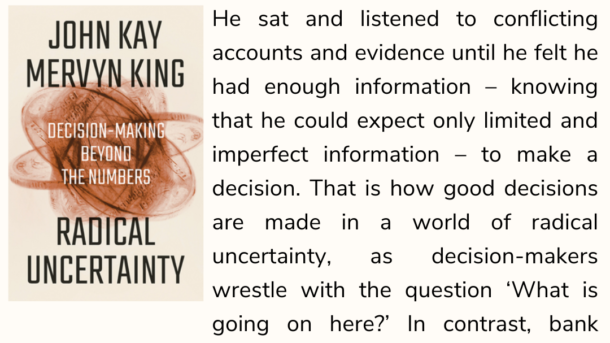Steve Jobs was not watching a Bayesian dial: he was waiting until he recognised ‘the next big thing’. And Winston Churchill also played a waiting game as he saw the United States gradually dragged into war – and did his utmost to accelerate American entry. We do not know whether Obama walked into the fateful meeting with a prior probability in his mind: we hope not. He sat and listened to conflicting accounts and evidence until he felt he had enough information – knowing that he could expect only limited and imperfect information – to make a decision. That is how good decisions are made in a world of radical uncertainty, as decision-makers wrestle with the question ‘What is going on here?’ In contrast, bank executives relied on the judgements of their risk professionals, who in turn relied on Bayesian techniques, and the results were not encouraging. Woodford’s students, even though they were familiar with the principles of Bayesian reasoning, did not approach their task in this way – even though the experiment was designed to stimulate them to do so. Woodford’s students were not making bad decisions. They simply did not use Bayesian reasoning to process new information. An alternative interpretation of the experimental results is that the students were developing a sequence of narratives, and challenging and revising the narrative at discrete intervals as they went along. Far from being systematically biased, the students were systematically struggling to come to terms with radical uncertainty in the manner in which thoughtful people normally come to terms with it. (Or, perhaps, waiting for the session to end and to collect their $10.) When we express doubt about the practical relevance of the Bayesian dial, we are not for a moment suggesting that people should not modify their views in the light of new information. We think they should manage radical uncertainty as President Obama did – listening to evidence, hearing pros and cons, inviting challenges to the prevailing narrative, and finally reaching a considered decision. And Obama might have been forced, as Carter had been, to change his decision when he learnt of problems in the execution of the agreed plan which had not been anticipated. In the fortunate event this proved unnecessary.
What do you do when you have to make decisions when there are no or false probabilities that you can consult from? Steve Jobs certainly didn’t calculate probabilities before he chose to venture into PCs. If you only rely on making decisions based on maximum probability of success, it might actually prevent you from making the most meaningful life decisions you can make. The entrepreneur who only assesses whether to begin a venture based on probability probably wouldn’t do so as the numbers wouldn’t check out.
Assessing important life decisions based on probability should always be a consideration, and can help us be aware of the risks. However, it should just be a guideline and never your only principle. Given that we are unable to assess real probability due to the vast amount of uncertainties, relying on numbers simply give you a “false sense of precision”.



